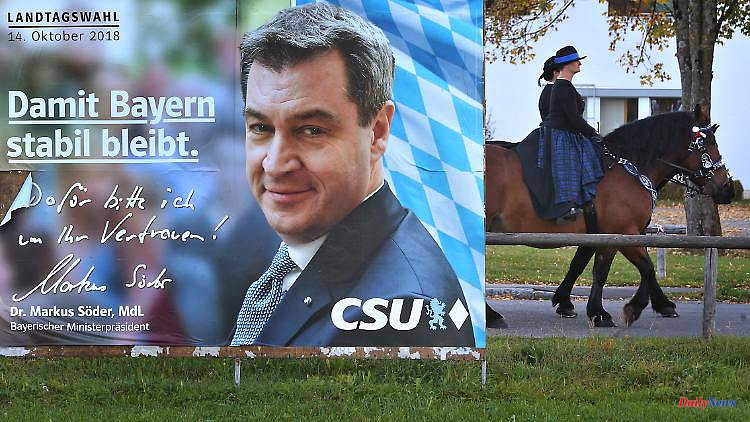More than half of Bavarians would choose Markus Söder if the prime minister were elected directly. His CSU is not doing quite as well, but can hope to jump over the 40 percent hurdle again next year.
The Bavarian Prime Minister Markus Söder still has comparatively high sympathy values in his state. This is the result of a survey by the opinion research institute Forsa for RTL and ntv.
If the Bavarian voters could choose their Prime Minister themselves, 53 percent would choose Söder. Six percent would vote for the Bavarian SPD chairman Florian von Brunn, and 11 percent would choose the leader of the Greens, Ludwig Hartmann. “None of them” answer 30 percent.
This means that Söder's values are significantly better than those of CDU leader Friedrich Merz on the Chancellor question in Bavaria. If you could elect the Federal Chancellor directly, 39 percent would choose incumbent Olaf Scholz in Bavaria, only 19 percent for the CDU chairman Friedrich Merz. 42 percent would choose neither of them. In Germany as a whole, 20 percent would choose Merz and 41 percent Scholz.
As in the 2021 federal election, the CSU in Bavaria would achieve a significantly better result than the CDU in the rest of Germany. In a federal election, 36 percent of Bavarians would vote for the CSU. In Germany as a whole, 27 percent would choose the Union, in the 15 federal states outside of Bavaria 26 percent would choose the CDU. The better performance of the CSU thus contributes one percentage point to the nationwide result of the Union.
In a federal election in Bavaria, 22 percent went to the Greens (nationwide it is currently 23 percent in the RTL/ntv trend barometer), 12 percent to the SPD (nationwide 19), 8 percent to the FDP (nationwide 8), 8 percent to the AfD (nationwide 10) and 2 percent on the Left Party (nationwide 4). 12 percent would opt for other parties (nationwide 9 percent). Apart from the Union, only the SPD is enough to change the nationwide election result. Your result would be one point better in a Germany without Bavaria.
In a state election in Free State, the CSU could expect a significantly better result than in a federal election and would again reach the 40 percent mark. Like the state CDU in Schleswig-Holstein and North Rhine-Westphalia, the CSU in Bavaria also has a pronounced “state bonus” compared to the Union as a whole. The next state elections in Bavaria are scheduled to take place in 2023.
In the state election survey, the Greens achieved 20 percent, the Free Voters 10 percent, the SPD 9 percent, the FDP 6 percent, the AfD 7 percent and the left 1 percent. 7 percent would opt for other parties.
The state bonus of the CSU is based primarily on the fact that the CSU is believed to have significantly greater political competence than the Union as a whole: 38 percent of Bavarian voters believe that the CSU is the party that can best deal with the problems in Bavaria becomes. On the other hand, just 11 percent believe that the Union as a whole has political competence, as do voters throughout Germany.
When asked which party is best at dealing with the problems in Bavaria, 15 percent named the Greens, 5 percent the SPD, 2 percent the FDP and 9 percent other parties. With a view to the problems throughout Germany, 21 percent of the Bavarian voters named the Greens, 10 percent the SPD and 2 percent the FDP.
The data was collected by the market and opinion research institute Forsa on behalf of RTL Germany from May 23 to June 3, 2022. Database: 1049 respondents. Statistical error tolerance: /- 3 percentage points.
More information about Forsa hereForsa surveys commissioned by RTL Germany












